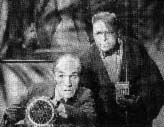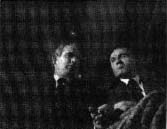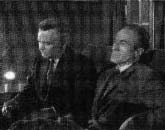| ���"He had good reason for thinking like that, of course. In those days unless you lived relatively near the Alexandra Palace you couldn't receive the picture, and the sets were so incredibly expensive that they were a kind of rich man's toy. In those couple of years I was working in televi- sion before it closed down shortly after war broke out, I didn't even know anyone who had a television set." ���There is, of course, no surviving record of those early broadcasts apart from a brief listing in yellowing copies of the Radio Times.�"Usually we did two live perform- ances of the same play in a week, one on a Thursday or Friday evening and again on the Sunday afternoon. The broadcast would last for as long as the play lasted - anything from an hour and 15 minutes to two hours and 35 minutes. ���"It was almost always plays derived from the theatre, because they couldn't afford original writing. They were very limited in terms of sets. The camera was mounted on a kind of trolley supported by bicycle wheels: the sets would be lined up beside one another rather chronologically, like a row of shoeboxes, with the first act at the far left and so on. ���"Our faces were literally painted the col- out of an orange, except for our eyelids and lips which were navy blue. It was the only way in which any kind of discernible contrast could be achieved." Moving Abroad ���The television service was revived in the late 1940s. As one of the few actors with any experience of television, Barry was very much in demand. Then in 1950 the Morse family visited relatives in Canada. At a time when tourists were allowed to take a maximum of 50 out of Britain, for Barry it had to be a working holiday. ���"I talked to the head of BBC drama, John Gielgud's brother Val, about the possibil- ity of doing one or two jobs while in Canada. He said that the CBC, the Cana- dian Broadcasting Company, had a won- derful radio service, and he'd drop a line to his opposite number. So, while we were staying in Montreal I did all sorts of radio things for the CBC and I learned that they were about to launch a televi- sion service. ���"They came to me and said, 'You're the only actor in this country who's ever faced a television camera, you really must stay around.' So, for various family reasons we decided to stay, and it was extremely ex- |
 Barry Morse as an alien investigating murder in the Outer Limits�episode Controlled Experiment. citing. I began to play in a great many dif- ferent types of television show in Canada. ���"In those days you could have put the corps of professional actors in Canada into a relatively small bus, so it began to at- tract actors from the UK. It came to be believed among actors that I more or less ran the Canadian television industry, and all sorts of people turned up. Among them was Patrick Macnee, who became a close friend. Our house in Canada was known as the 'British Embassy'. Gone ���"There were all sorts of programmes being made, some series, lots of one-off dramas, including a lot of very good Sci- ence Fiction. The sad thing is that so few of those programmes were preserved. The technology to do so was very primitive, and no one, not even at the CBC, gave any thought to preserving programmes. ���"That attitude is incredible when you consider that The Fugitive, which is ex- actly 30 years old, is now being shown in just about every country in the world. In the USA you can watch it twice a day, six days a week, if you so wish. And of course, we don't get a dime from it. Nobody be- lieved anyone would want to watch pro- grammes that were more than two or three years old. Although we did have a residual clause it evaporated to vanishing point after three years." ���By the late 1950s the Morse family were settled in Toronto, which had become the centre of the Canadian television indus- try. Barry was also in demand across the border. "I started to commute to New York, and less frequently LA, to do live tv shows like Studio One,�wonderfully good plays and dramas in an anthology format, at a time when writers like Paddy Cheyefsky were writing for television. ���"By this time the were starting to make series on film as well, and I appeared in |
series such as The Twilight Zone and The Outer Limits, and the focus shifted from New York to Los Angeles. I came to know and work for many of the tv producers, including Quinn Martin. Quinn was do- ing The Untouchables and I played a whole section of different characters in that, a Romanian drug smuggler in one, a French champagne smuggler in another." The Fugitive ���It was The Fugitive, produced by Quinn Martin, which made Barry a tv star. For four seasons starting in 1963, Barry's char- acter, Lt. Gerard, pursued convicted mur- derer Dr. David Kimble, played by David Janssen, across America. Kimble, in turn, was searching for the one-armed man who had really killed his wife. ���"One day Quinn called me. He was working on a series and there was a recur- ring character he wanted me to play. When the script came and it was all about this upstanding, kind, decent, honest doctor, on the run from the law as represented by this obseesive, determined middle-American detective. I thought they'd sent me the wrong script. ���"In the original outline Lt. Gerard was a rather clichd detective type, so there was no shortage of actors who could play him. Quinn and I had lunch, and I was about to tell him there'd been a mistake, when he started to talk. 'Now, this detective.' That's when I realized he wanted me to play Gerard. I didn't want to say it was clichd,  Barry Morse as Lt. Gerard in the title sequence for The Fugitive  |
 |